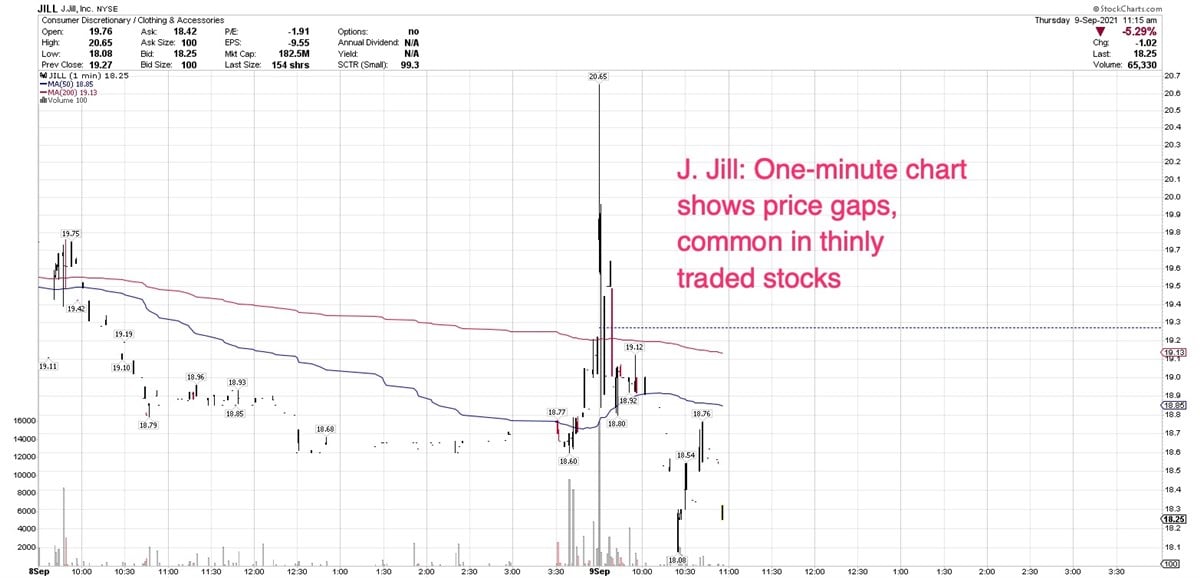Shares of women’s clothing retailer
J. Jill NYSE: JILL opened lower Thursday following the Massachusetts-based company’s second-quarter report.
The company reported a loss of $1.98 per share.
Net income, adjusted for one-time costs and gains, came in at $0.93 per share, up from a loss of $1.58 in the second quarter of 2020.
Adjusted EBITA for the second quarter was $32.7 million, compared to a loss of $6.5 million a year ago.
Revenue was $159.236 million, up 72% from the year-earlier, and also an increase over $129.1 million in sales in the first quarter.
According to MarketBeat earnings data, J. Jill has a spotty history when it comes to meeting analyst views. Before the adjustments, analysts expected a loss of $1.40 per share.
In the company’s earnings release, J. Jill CEO Claire Spofford said, "We are pleased with our second-quarter results and the sequential topline improvement we delivered. This performance was driven by strong full-price selling as our customers continue to respond to the newness and novelty we are flowing into the assortment both online and in our stores.”
Looking forward, she noted, "We enter the back half of the year with further confidence in our ability to execute against our objectives. While we, like others in the industry, expect to experience increased headwinds from supply chain disruption, we continue to position J.Jill for long-term sustainable growth."
In other words, the usual supply-chain issues, cited by almost every company recently, will also affect J. Jill’s ability to execute on its strategy.
For clothing retailers, supply-chain disruptions include congestion at international ports, as well as manufacturing slowdowns in regions where Covid cases are on the rise. Those backlogs are requiring some companies to pay premiums for speedy freight deliveries, in order to keep inventories stocked.
Retailers don’t want unsold inventory sitting around, which results in markdowns. This year, a growing number of clothing retailers are trying to avoid putting items on sale, and working to entice customers to buy when they see an item, rather than waiting for a lower price. That would be a shift in consumer behavior, but you could add it to the list of many behavioral shifts we’ve all seen in the past 18 months.
Jill cited full-price selling in its previous quarterly report. It was also mentioned in the past two quarters by another small-cap women’s clothing retailer,
Chico’s Fas NYSE: CHS.
Other retailers, such as Gap Inc. NYSE: GPS and Abercrombie & Fitch NYSE: ANF have also noted their current strategy of selling at full price to increase margins as they focus on inventory management.
Given the continued supply-chain and pandemic-related challenges, J. Jill said it would not issue guidance.
In its release, the company stated, “The impact of the Covid-19 pandemic and the pace at which there are new developments, locally and globally, has created a great deal of uncertainty. Consequently, the company is not providing financial guidance at this time but expects to close about 20 stores in fiscal 2021. The company now expects total capital spend in fiscal 2021 to be approximately $8.0 million.”
The company shuttered four stores in the second quarter, ending the quarter with 261 stores.
That’s in line with the trend toward more online sales.
The company said direct-to-consumer net sales grew 21.1% over the same quarter in 2020, and represented 51.3% of total net sales.
The percentage of online sales was greater in the 26 weeks ended August 1, 2020, when lockdowns were in place and customers were more cautious about going into physical stores, but digital sales are still a fast-growing channel.
With a market capitalization of just $185.9 million, and with only 3 million shares in float, it’s no surprise that J. Jill shows some erratic trading. For example, a glance at an intraday chart shows wide price gaps, which is not unusual in a thinly traded stock.
As it continues consolidating below its August 3 high of $24.50, J. Jill is not a stock that’s in buy range right now, and would-be investors should realize that small stocks like this are risky propositions at any time.

Before you consider J.Jill, you'll want to hear this.
MarketBeat keeps track of Wall Street's top-rated and best performing research analysts and the stocks they recommend to their clients on a daily basis. MarketBeat has identified the five stocks that top analysts are quietly whispering to their clients to buy now before the broader market catches on... and J.Jill wasn't on the list.
While J.Jill currently has a Moderate Buy rating among analysts, top-rated analysts believe these five stocks are better buys.
View The Five Stocks Here
Discover the next wave of investment opportunities with our report, 7 Stocks That Will Be Magnificent in 2025. Explore companies poised to replicate the growth, innovation, and value creation of the tech giants dominating today's markets.
Get This Free Report